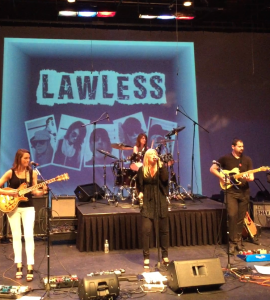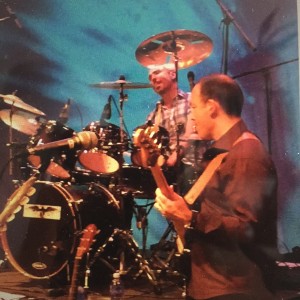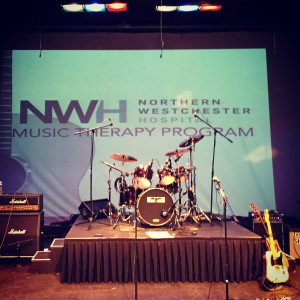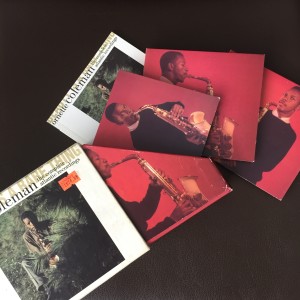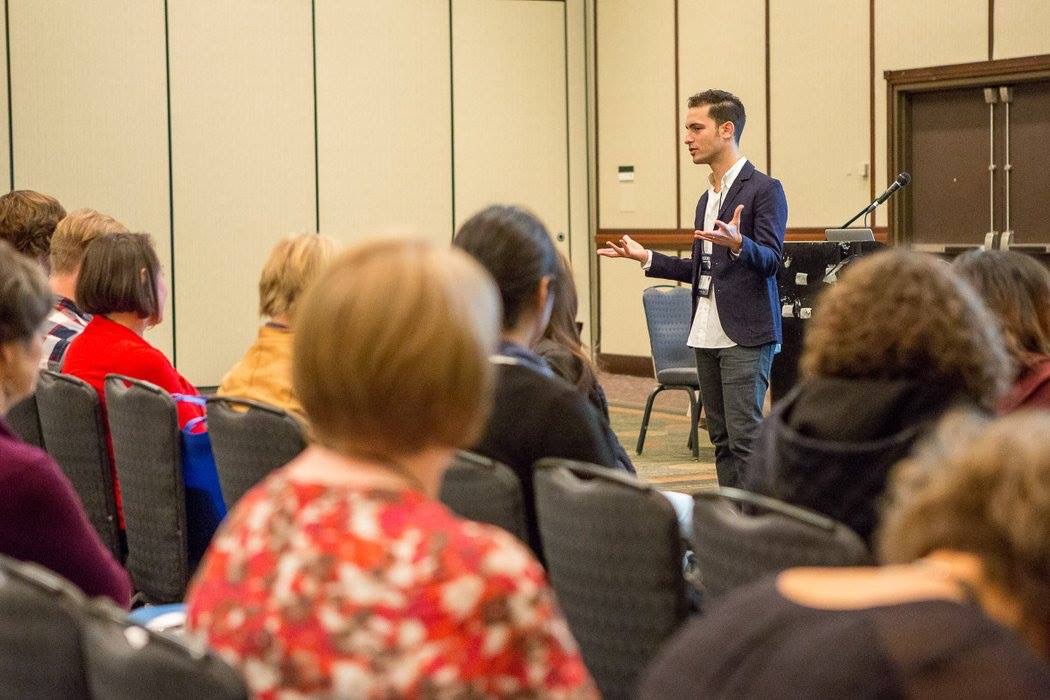
Latin Rhythms at AMTA 2015
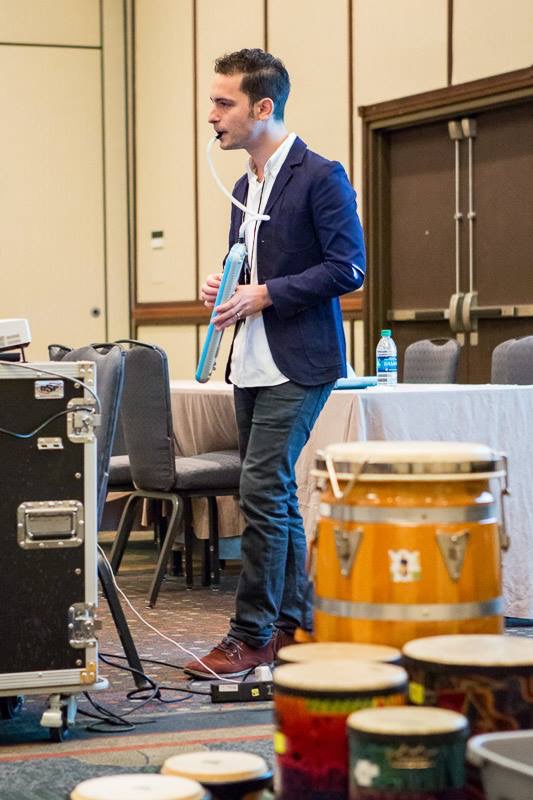
Every year, the American Music Therapy Association holds a national conference where the music therapy community meets to discuss the latest advancements in our field and make important decisions that pave the way for the present and future of the profession. I love attending these conferences because it helps me remain acquainted with the latest research. It also gives me an opportunity to learn from others, share my experience, and grow as a clinician through the many enlightening discussions and conversations I get to have with my brilliant friends and colleagues.
This year the conference was held in Kansas City, and I had the honor of presenting about Latin rhythms and how they can be used clinically.
[/x_text]I was glad to have a fantastic turn-out of about 70 music therapists from around the country. We discussed the importance of taking culture-specific considerations when working with our clients, and focused on the incredibly diverse and influential Latin community. We briefly touched on major musical styles from Latin America, yet spent most of our time looking closely at rhythms based on clave such as Son Montuno, Cha-cha-cha, and Bolero. Participants got a chance to understand, play, and experience the different components of these fun intricate rhythms. We proceeded to discuss how we can use these material with Latin and non-Latin clients in different music therapy settings. We all had an absolute blast and came out dancing with our enriched musicality. Check out the video on the right to get a glance at our experience! To learn more about Latin Rhythms in music therapy click here.
[/x_text]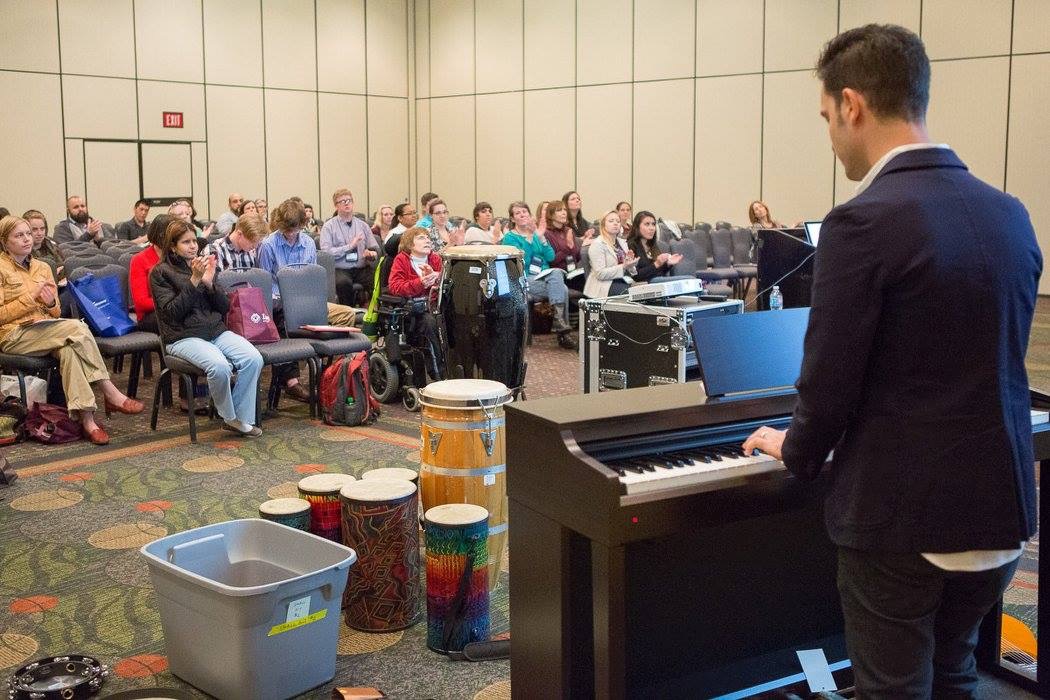
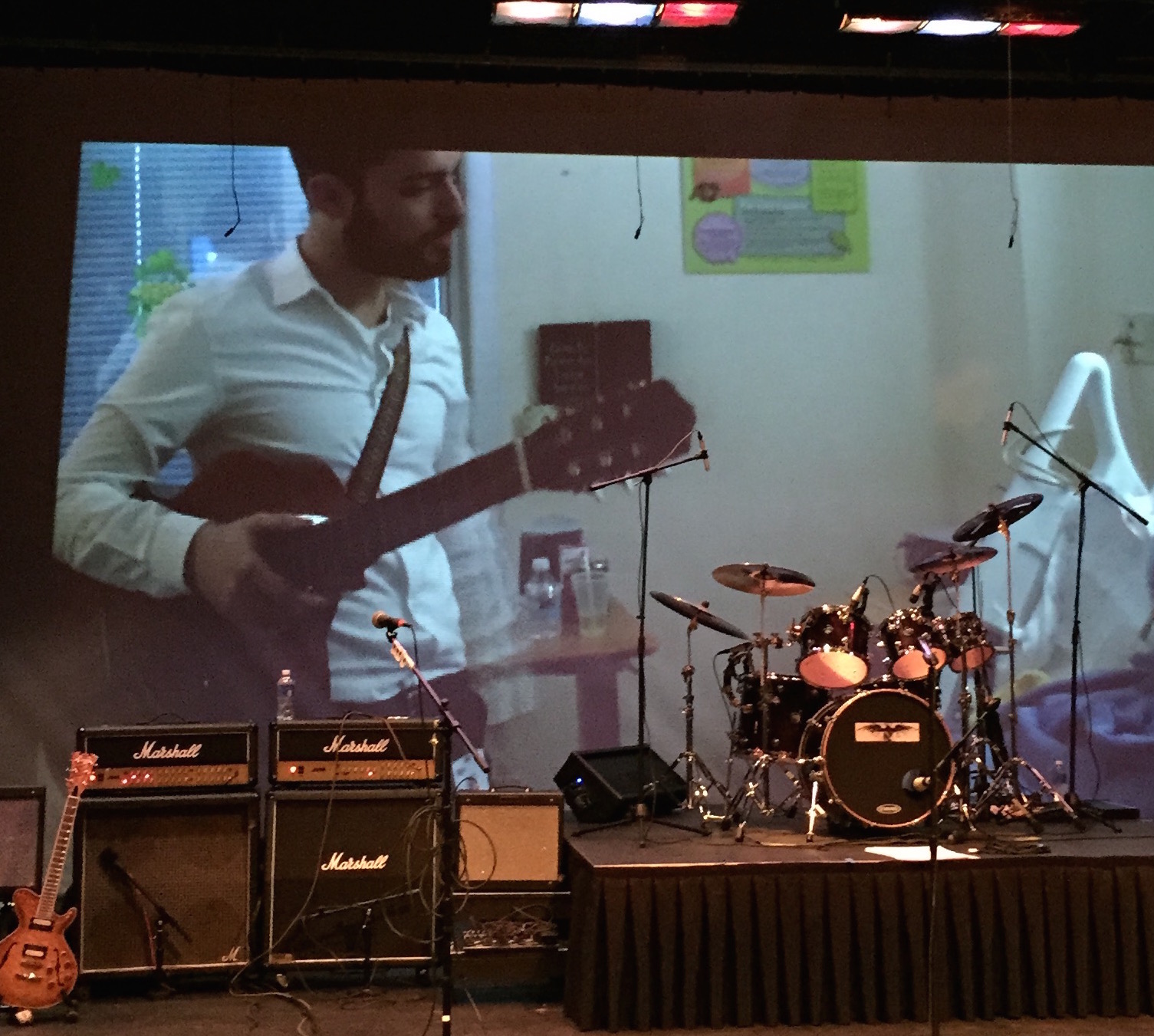
Northern Westchester Rocks for Music Therapy
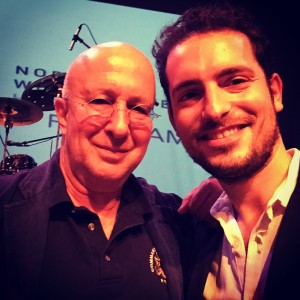 We had an incredible time at the annual Moms and Dads Rock For Music Therapy concert that helps support our program in Northern Westchester Hospital, held at the beautiful Harvey School in Katonah, NY.
We had an incredible time at the annual Moms and Dads Rock For Music Therapy concert that helps support our program in Northern Westchester Hospital, held at the beautiful Harvey School in Katonah, NY.
The lineup consisted of the excellent bands Lawless, ONL, and The Shaves, along with a special appearance by the amazing Paul Shaffer. Comedienne Christine O’Leary bridged the acts together, as Cathy and Paul Shaffer, and Anita and John Bae, hosted the wonderful evening in collaboration with the Northern Westchester Hospital Foundation.
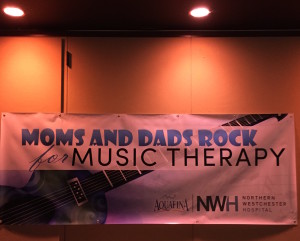 It is an absolute honor to work with a community that is so eager to make a difference in the quality of life of its members. I can proudly say that we are building something special together.
It is an absolute honor to work with a community that is so eager to make a difference in the quality of life of its members. I can proudly say that we are building something special together.
I want to take the opportunity to give special thanks to Cathy and Paul Shaffer, Joel Seligman, Maria Hale, Keeva Young-Wright, and Whitney Wasserman, for their dedication to music therapy and their trust in Berko Music Therapy. To Susan Raskin, Tony Russo, Carolyn Szala, and Joanie O’Keefe, who work with me every day. And to all the doctors, therapists, nurses, and receptionists, who collaborate with us, cheer us at our arrival, and believe in the work we do. The following video was shot by Ben Sultan and edited by Sue Lacolla, and is just a grasp of what goes on in the hospital every week.
Below are a few more images of the night. Thanks again to the sponsors, bands, hosts, and attendees for making it happen.
For more coverage of the event please visit: https://www.allaboutbedford.com/harvey-school-14-15.html
Learn More
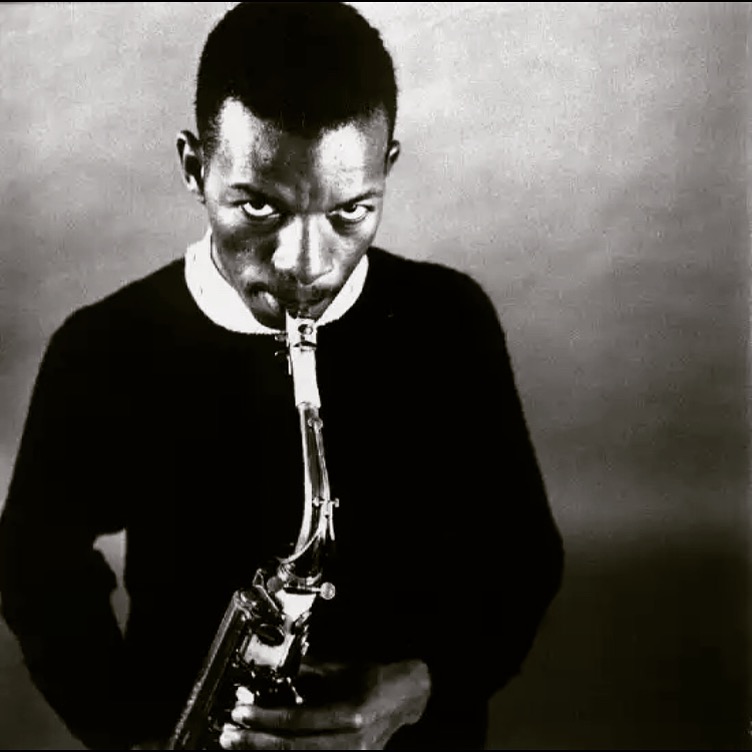
Ornette Coleman and Music Therapy
Ornette Coleman, one of the most legendary and influential musicians of all time, passed away on June 11th, 2015, at the age of 85. I first heard of Ornette when my teacher Omar Tamez got me into all these amazing jazz albums back in Monterrey, Mexico. I also remember that during my first year at Berklee College of Music, there was a time when I couldn’t stop listening to the “Beauty is a rare thing” box set I bought at one of the CD stores around school. It was the summer of 2006, and I remember this music had a big impact on me, as I searched for my own identity while living in a new country within the structure of formal music education.
The music of these records really moved me. It felt so organic, honest, and personal. I loved the melodies, the interaction, the feel. One of my favorite pieces was “Una Muy Bonita” (1960), which featured the ‘original quartet’ formed by some of my favorite musicians (Ornette Coleman-sax, Don Cherry-trumpet, Charlie Haden-bass, and Billy Higgins-drums).
Ornette is regarded as one of the pioneers of free jazz, partly because of his album “Free Jazz” (1960), in which there are two quartets playing together.
https://youtu.be/xbZIiom9rDA
But even if regarded as a pioneer of free jazz, Ornette’s work still relied heavily on composition. These were often melodies without a set sequence of chords, played by a band without a piano player. Ornette liked to improvise without feeling confined to a pre-conceived harmonic structure, and his play in between notes was often perceived as out-of-tune by colleagues and critics.
https://youtu.be/bJULMOw69EI
The day Ornette passed away, his influence was felt on many circles in social media, where countless people expressed gratitude and admiration for his life and vision. Many of the comments stated by musicians and artists identified Ornette as an influential source of inspiration in their own search for authenticity. Guitarist Pat Metheny wrote about it 16 years earlier in the preface to the book Ornette Coleman: His life and music by Peter Niklas Wilson:
“He has inspired me -and by this time it must be thousands of other musicians- to answer to a standard that demands that we look into our own hearts and minds to see what we may have to offer in our own personal musical languages -if we can only muster up the courage to listen to the songs inside of us the way Ornette has done.” – Pat Metheny
The process of exploring our authentic musical self is something we often work with in music therapy. At Berko Music Therapy, we often help people access the music resources they have acquired throughout life, whether their experience includes any form of training or not. This often results in a creative process where people play instruments they have never played before, which can facilitate a deep level of introspection, self-expression and genuineness. Perhaps Ornette was thinking along those lines when playing violin and trumpet, instruments in which he had no formal training.
https://youtu.be/y09k4zyIfO8
One of the things that separated Ornette from other musicians was his uncanny ability to create his own world. Much like a Miro, or a Pollock, he defined his own rules and reached a very unique and personal level of creative expression while defying established artistic and societal norms and mediums. We can learn a lot from the expansive ways in which Ornette thought about music. In the following interview, he at times almost sounds like a music therapist.
“My real concern for the things that I would like to perfect in music is to heal (suffering, pain, solitude), when you are depressed, music seems to be a very good dose of light that causes people to feel a lot better.” -Ornette Coleman
More selected videos:
Learn More
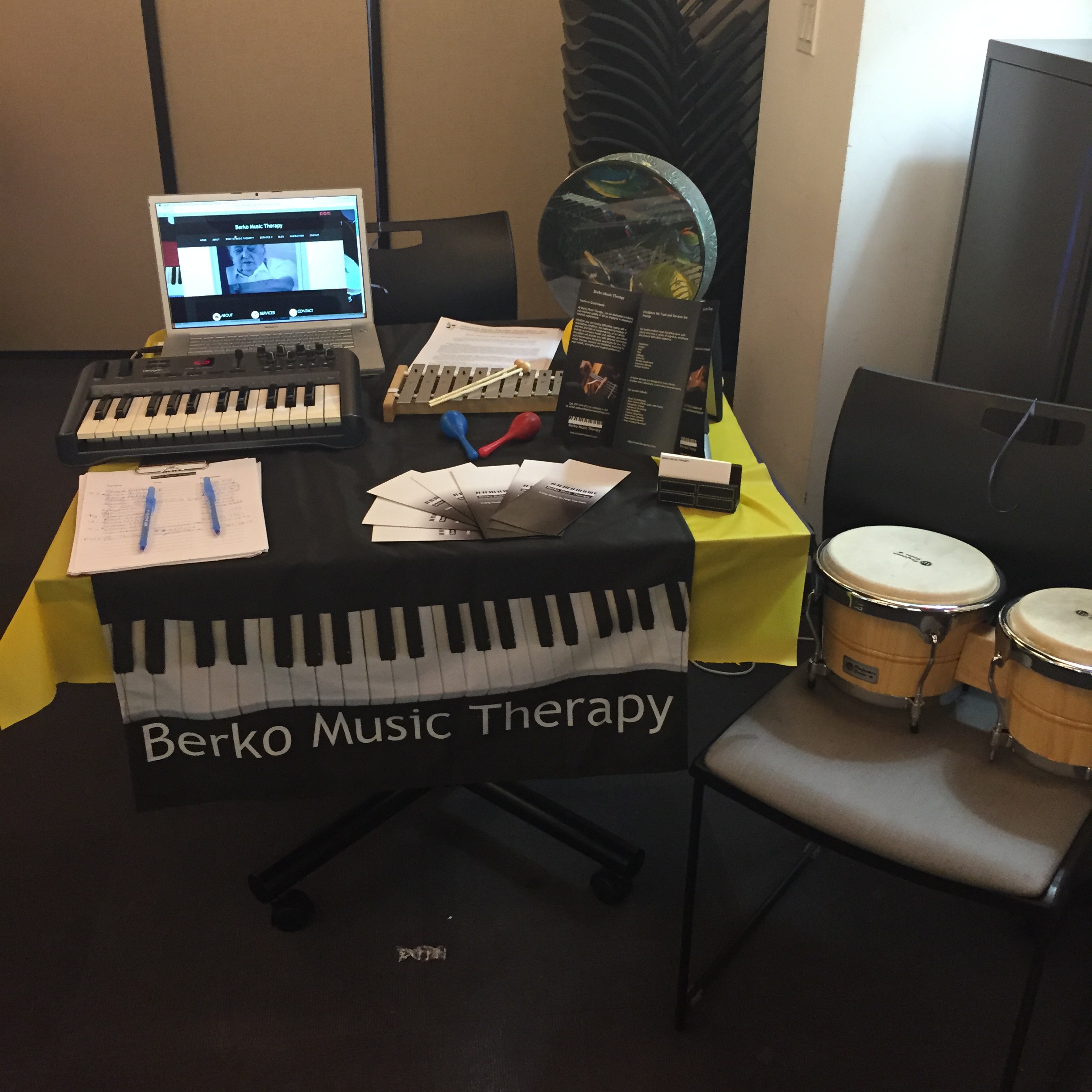
Community Health Fair
We recently participated in a wonderful holistic health fair hosted by Stein Senior Center. We were invited along with other healthcare providers, and had the opportunity to chat with members, families, and clinicians about how music therapy can help the community. The instruments displayed were hard to resist and improvised jams naturally emerged from numerous interactions. Once again it is evident that the power of music is immediately available for those who dare to use it.

To learn more call us at 347-774-1712 or email us below.
[contact_form]
A Music Therapist on Skis
I recently had the opportunity to go skiing for the first time. At first I was unsure whether attaching metal to my feet to slide down on snow from the top of a mountain was a terrible or very good idea. The astonishing beauty of the surrounding landscape helped me go with the latter.
I was amazed at the amount of people of all ages that come from all parts of the world to do this. Each one at their own level of mastery. There are 7 year old experts and 60 year old novices. There are adaptive opportunities for individuals who are blind or paraplegic.
My experience began in ski school. An instructor taught me to maintain balance, to stop, to turn. I felt good about my progress and got a lot from every part of the process.
Eventually I made it down the mountain. At many points I lost my balance fearing I would crash against a tree or fall down the abyss. At times I stopped thinking and allowed myself to feel my existence within nature.
Once while taking the lift with the instructor, she told me that she always wanted to play an instrument but never really tried because she has no talent. This is something that us music therapists hear quite often. A lot of people actually think that you need to have some magical talent to play music. It is true that there are a lot of ridiculously talented musicians. Some might even be geniuses. But most people who play music are not even professional. You don’t necessarily have to try to make a living out of it. Just like most people here are not even trying to make it to the Olympics. Some take it more seriously than others and some are actually pretty good. But even those of us who spend half the time on our butts can have a meaningful experience.
My next time down I let myself go a little bit more and was able to maintain much better balance. I was able to focus my awareness on the present moment and enjoy the process. Even at 2 miles per hour, on flat ground, the snow still absorbs the sound and the quiet is accompanied by these endless ice cream mountains.
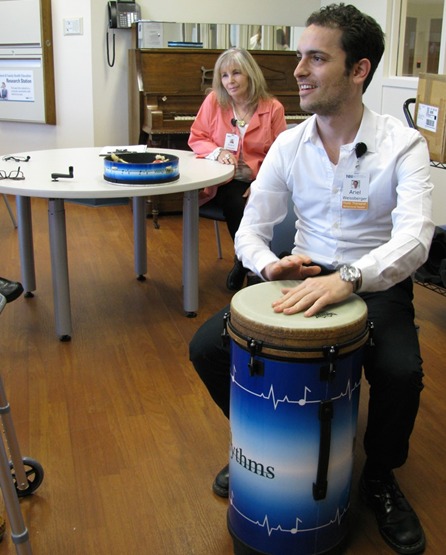
Back in Northern Westchester Hospital
Berko Music Therapy is back in Northern Westchester Hospital with a new revamped music therapy program in collaboration with patient advocacy and integrative health departments. Based on the Planet Tree award-winning program we were previously involved with at the same facility, we are providing individual and group music therapy sessions for inpatient psychiatry, adult inpatient rehabilitation, post-surgery and general hospital units.
We are working within the clinical goals of each patient in order to help achieve maximum gains in treatment, accelerate recovery and cope with hospitalization.
Among the supporters of the program are Cathy and Paul Schaffer (David Letterman’s musical director).
The following is an interview published in the Journal News with vice president of patient advocacy and patient centered services Maria Hale, who discusses the impact of the program.
http://www.lohud.com/story/news/2014/06/23/music-therapy-benefits-hospital-patients/11271557/
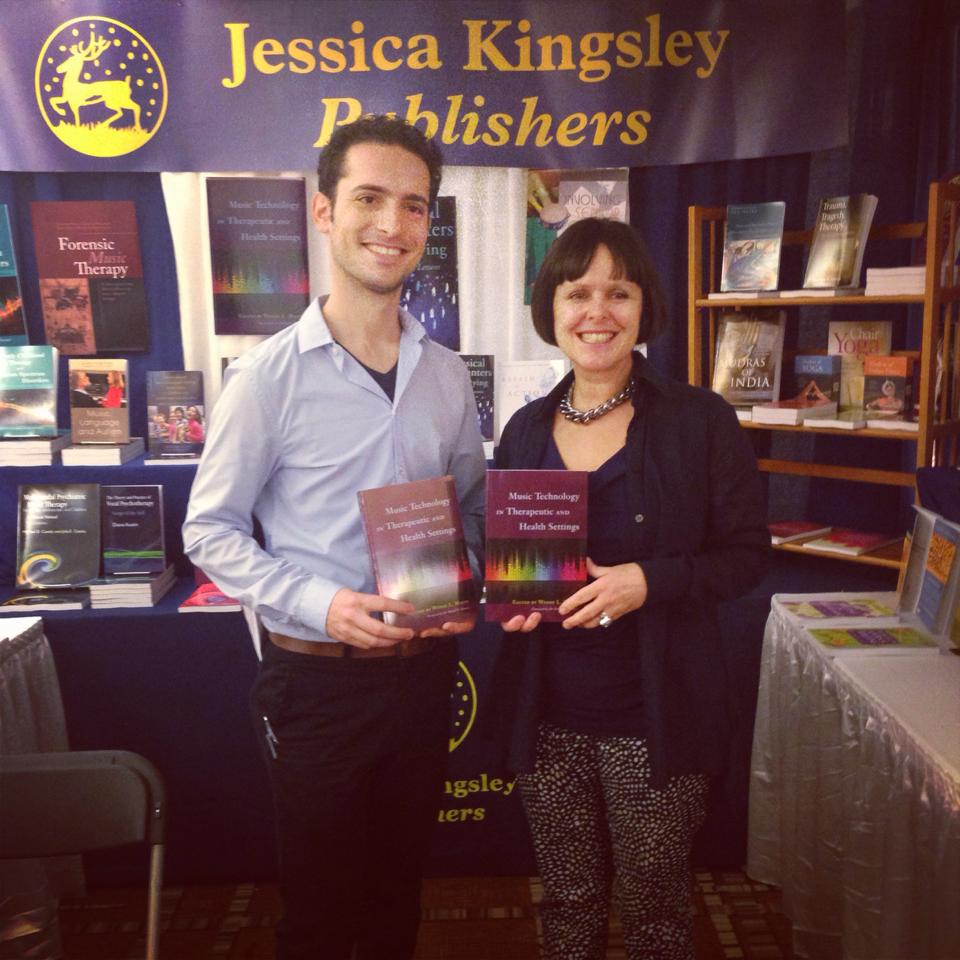
Published! – On Music Therapy and Technology
I have the honor to be featured in Dr. Wendy Magee’s new book called Music Technology in Therapeutic Health Settings, published by Jessica Kingsley Publishers, one of the top publishing companies in the field .
Dr. Wendy Magee is a world renown professor, researcher and music therapist. For this project, she recruited a number of music therapists currently doing breakthrough work with music technology, and asked each to write a chapter about it.
I wrote chapter 15. Garageband as a Digital Co-Facilitator: Creating and Capturing Moments with Adults and Elderly People with Chronic Health Conditions.
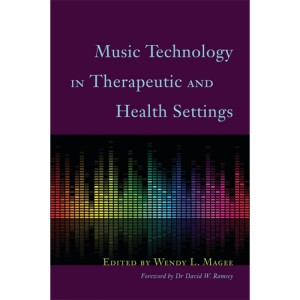 In this chapter I talk about how I used Apple’s music software Garageband in a music therapy group I ran for Spanish speaking registrants at an adult day health center in Bronx, NY. This was one of the many programs I had the opportunity to design and implement while working with the Institute for Music for Neurologic Function. The group recorded a full album of original songs as part of their creative therapeutic process.
In this chapter I talk about how I used Apple’s music software Garageband in a music therapy group I ran for Spanish speaking registrants at an adult day health center in Bronx, NY. This was one of the many programs I had the opportunity to design and implement while working with the Institute for Music for Neurologic Function. The group recorded a full album of original songs as part of their creative therapeutic process.
Perhaps my central argument is that technology not only can facilitate musical, creative and therapeutic processes, but also help adults and elderly feel connected to the current trends in the world surrounding them. In this group in particular, members have at least three barriers that are potentially isolating: culture, age and health related. The use of technological devices such as laptops and ipods may at least partially diminish a little bit of each.
A number of participants in the program reported feeling more connected to their younger family members after gaining a better understanding of current technology related cultural trends. They were also able to work together relying on each other’s strengths to minimize their weaknesses. A stroke survivor with a speech deficit was able to thrive in the group due to her intact memory, while a woman with early stages of dementia was able to utilize her great diction to contribute to the group in spite of her deteriorating memory skills.
With the use of technology we were able to capture the meaningful moments we created, maximize them and reflect them back. The production of the album provided the context in which we relied on for guidance and purpose. In the chapter, I describe some techniques implemented to support, fulfill and magnify the creative ideas of the group. Such techniques include overdubbing, multi-tracking, and looping.
I am hoping some of these ideas can add something to the ever present yet increasingly pertinent discussion of technology related issues in the field. What is our role as music therapists/album producers? How much should we add our own aesthetic ideas? How much do we ‘fix’ notes and mistakes? What are some counter-indications to the use of technology?
Congratulations to Dr. Wendy Magee for putting together this extremely important book, to Dr. David Ramsey -who I consider my mentor- for his genius foreword, and to all the brilliant music therapists who wrote and participated. I am thrilled to be a part of it!
You may order the book directly at Jessica Kingsley Publishers or at Amazon.
Learn More
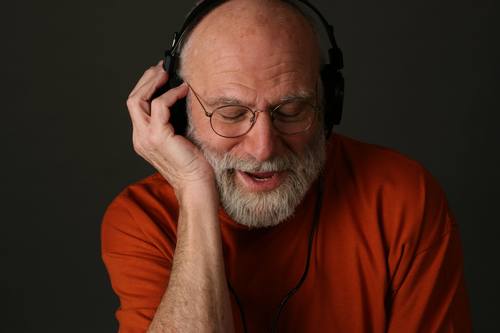
Oliver Sacks’s Life Lessons
A few weeks ago, the great neurologist/writer Oliver Sacks reflected in a New York Times column on the experience of turning 80 years old.
He embraces the new experience of approaching the end of his life.
“I often feel that life is about to begin, only to realize it is almost over.”
Learn More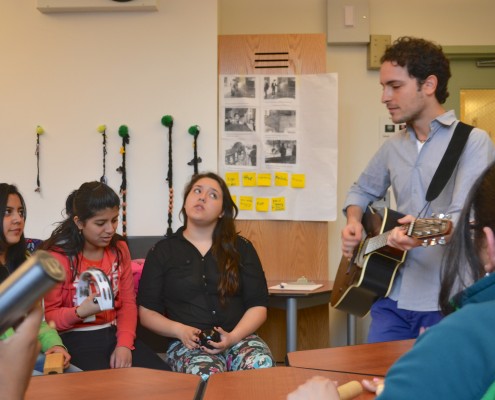
Music is Universal
I recently had the opportunity to work with some amazing people at Laguardia International High School. I was invited by art therapist Alicia Ballestas to give a workshop for students who immigrated from Latin American countries.
It was greatly inspiring to hear what these bright young minds had to say.
These are some of the main points we discussed: (more…)
Learn More
